

Google Blurs The Line Between Web And Native Apps On Android. Today at Google I/O, Chrome Director of Product Management Avni Shah introduced the new version of Chrome coming in the next Android update dubbed Android L.
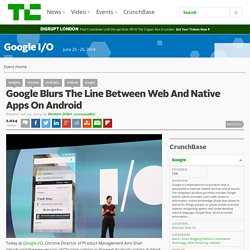
As expected, we got a couple of feature updates. But it isn’t just a better version of Chrome. There is a clear and more profound message coming from Google. The company wants to blend native apps with web tabs. And the end of native apps as we know them could be closer than we might think. In Android L, the redesigned app switcher looks a lot like Safari on iOS 7. Similarly, Google is expanding its App Indexing API to all Android apps. Knowing all this, imagine for a second what Android L will look like.
Native or Web-Based? Selecting the Right Approach for Your Mobile App. So you've decided to create a mobile application.
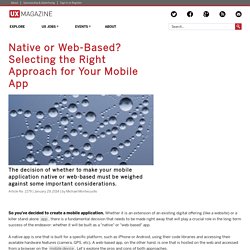
Whether it is an extension of an existing digital offering (like a website) or a killer stand-alone app, there is a fundamental decision that needs to be made right away that will play a crucial role in the long-term success of the endeavor: whether it will be built as a "native" or "web-based" app. A native app is one that is built for a specific platform, such as iPhone or Android, using their code libraries and accessing their available hardware features (camera, GPS, etc). A web-based app, on the other hand, is one that is hosted on the web and accessed from a browser on the mobile device.
Let's explore the pros and cons of both approaches. Can We Please Stop Fighting The Native vs. Web App Wars? James Long, a developer at Mozilla (and proponent of the web), insists that the mobile Web will never compete with native app development.

Ever. While Long is intentionally provocative with his prophecies, he may also be correct. At the same time, it's increasingly clear that this debate does not matter. At all. Web vs. native: let’s concede defeat. Page last changed today I feel it’s time to revisit the web vs. native debate, and concede defeat — or, at least, concede that the web cannot, and should not, compete with native when it comes to complex, app-like structures.
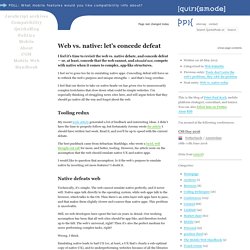
I feel we’ve gone too far in emulating native apps. Conceding defeat will force us to rethink the web’s purpose and unique strengths — and that’s long overdue. I feel that our desire to take on native heads-on has given rise to unnecessarily complex toolchains that slow down what could be simple websites. I’m especially thinking of struggling news sites here, and will argue below that they should go native all the way and forget about the web. My recent tools article generated a lot of feedback and interesting ideas. Building Apps using HTML, CSS, and JavaScript. With the arrival of multiple platforms & multiple smartphone devices, there has been a shift from native apps to mobile web app development.
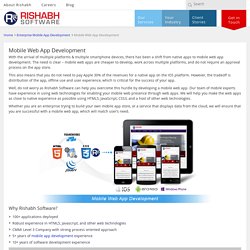
The need is clear – mobile web apps are cheaper to develop, work across multiple platforms, and do not require an approval process on the app store. This also means that you do not need to pay Apple 30% of the revenues for a native app on the iOS platform. Google brings apps into browsers. Mobile applications brought the power of the Internet into smartphones, turning them into gateways for services and information.
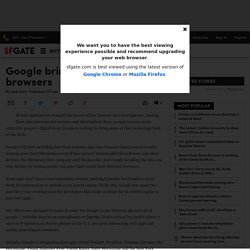
Now, as apps become more central to people’s digital lives, Google is looking to bring some of that technology back to the Web. Google will start including data from popular apps into browser-based search results, helping users find information even if they haven’t downloaded the software onto their devices, the Mountain View company said Wednesday. And Google is taking the idea one step further, by letting people run apps right inside their Internet browsers. Some apps don’t have a corresponding website, making it harder for Google to scour them for information to include in its search engine. To fix this, Google has spent the past two years creating tools for developers that make it easier for its search engine to peer into apps.
“We want to take a step back and see how users react and respond to this,” Huffman said. “It’s not loads of work,” Huffman said. AWS Device Farm Now Tests Browser Based Apps on iOS and Android Devices/ Posted 2 days ago by STUART PARKERSON, Publisher Amazon Web Services launched the AWS Device Farm this July to provide support for testing native and hybrid applications on iOS and Android devices.
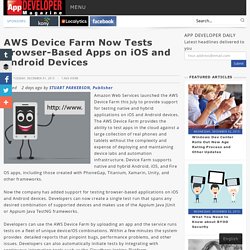
The AWS Device Farm provides the ability to test apps in the cloud against a large collection of real phones and tablets without the complexity and expense of deploying and maintaining device labs and automation infrastructure. Device Farm supports native and hybrid Android, iOS, and Fire OS apps, including those created with PhoneGap, Titanium, Xamarin, Unity, and other frameworks. Now the company has added support for testing browser-based applications on iOS and Android devices. Developers can now create a single test run that spans any desired combination of supported devices and makes use of the Appium Java JUnit or Appium Java TestNG frameworks. Developers can use the AWS Device Farm by uploading an app and the service runs tests on a fleet of unique device/OS combinations. Android iOS. Why Progressive Web Apps Are The Future Of Web Development. Application Shell Architecture will replace the need for hybrid apps.
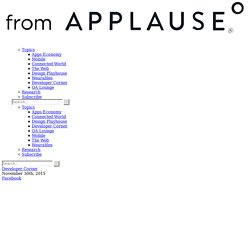
Apps are fast and the mobile websites are slow. In 2015, this particular problem has been one of the prime conversations in Web and app publishing and development. Facebook Instant Articles is theoretically predicated on speed. The Accelerated Mobile Pages Project (AMP) spearheaded by Twitter and Google and will launch in early 2016 with thousands of publishers already on board. Web Apps Are the Future. Native mobile apps are a little weird, if you stop and think about them.
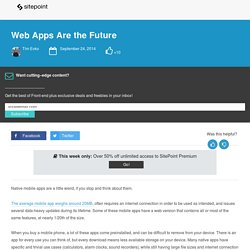
The average mobile app weighs around 20MB, often requires an internet connection in order to be used as intended, and issues several data-heavy updates during its lifetime. Some of these mobile apps have a web version that contains all or most of the same features, at nearly 1/20th of the size. Mobile: Native Apps, Web Apps, and Hybrid Apps. Start-ups refocus on mobile web as app-only strategy loses fizz. New Delhi/Bengaluru: Apps, as e-commerce companies told anyone who cared to listen, were the future.

HRD Minister Launches Several Mobile Apps, Web-Based Platforms. In line with the Modi government's Digital India initiative, Human Resource Development (HRD) ministry Saturday launched a number of mobile apps and web-based platforms allowing students to access study material online, and parents to keep a track of the performance and attendance of their children. Elaborating about the initiatives, HRD minister Smriti Irani said through mobile apps and website 'E-pathshala' students, parents and teachers can access study material online. Another initiative for CBSE schools 'Saransh', which was launched at an event at Vigyan Bhawan in Delhi, will help parents to compare subject-wise learning outcome of their children, with others at district, state and national levels.
"We are trying to leverage technology not only to bring more transparency in school education system but also to create new learning opportunities for the children," Irani told reporters while speaking about the initiatives.